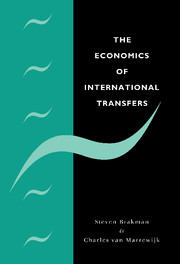Book contents
- Frontmatter
- Contents
- List of figures
- List of tables
- Preface
- 1 General overview and stylized facts
- 2 The Keynes–Ohlin controversy
- 3 Welfare effects: Samuelson's theorem
- 4 Generalizations of Samuelson's theorem
- 5 Clouds on the horizon 1: distortions
- 6 Clouds on the horizon 2: third parties
- 7 The economics of multilateral transfers
- 8 The consequences of tied aid
- 9 Imperfect competition
- 10 Dynamics, money and the balance of payments
- Mathematical appendix
- References
- Index
7 - The economics of multilateral transfers
Published online by Cambridge University Press: 07 January 2010
- Frontmatter
- Contents
- List of figures
- List of tables
- Preface
- 1 General overview and stylized facts
- 2 The Keynes–Ohlin controversy
- 3 Welfare effects: Samuelson's theorem
- 4 Generalizations of Samuelson's theorem
- 5 Clouds on the horizon 1: distortions
- 6 Clouds on the horizon 2: third parties
- 7 The economics of multilateral transfers
- 8 The consequences of tied aid
- 9 Imperfect competition
- 10 Dynamics, money and the balance of payments
- Mathematical appendix
- References
- Index
Summary
Introduction
As we have shown in the previous chapters, transfer paradoxes can arise in the presence of three participating countries: a donor, a recipient and a bystander. However, on many occasions aid is given in the form of multilateral aid or multilateral lending. The reason for multilateral aid is not as clear as one might expect. Why would a government give aid through a multilateral agency if it can give aid to a recipient bilaterally? Three reasons come to the fore. First, information gathering has a public-good character; for example, the assessment of the political situation for potential recipients, or the choice of which (environmental) projects or investment opportunities to support. Multilateral agencies might be better equipped for this specific informational task at the international level, just as the government of a country is at the national level. These agencies, such as the International Monetary Fund (IMF) or the World Bank, employ many specialists to watch closely the evolution of the economic situation in the developed and developing world. Of course, economies of scale may play a role in this process of information gathering. The task of monitoring the use of aid by a recipient can also be delegated to a multilateral agency. Second, rent-seeking behavior, either by the donor or the recipient, or other political problems can sometimes be prevented or avoided. The international relations between a donor and a recipient can sometimes become so clouded by political issues as to prevent a working economic relationship.
- Type
- Chapter
- Information
- The Economics of International Transfers , pp. 119 - 132Publisher: Cambridge University PressPrint publication year: 1998
- 1
- Cited by



